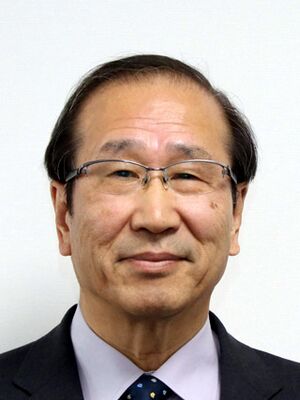Susumu Kitagawa facts for kids
Quick facts for kids
Susumu Kitagawa
|
|
|---|---|
| 北川 進 | |
 |
|
| Born | July 4, 1951 |
| Education | Kyoto University (BS, PhD) |
| Known for | Metal-organic frameworks |
| Awards | Humboldt Research Prize (2008) Thomson Reuters Citation Laureates (2010) Medal with Purple Ribbon (2011) De Gennes Prize (2013) Japan Academy Prize (2016) Nobel Prize in Chemistry (2025) |
| Scientific career | |
| Fields | Chemistry |
| Institutions | Kyoto University |
Susumu Kitagawa (北川 進, Kitagawa Susumu, born 4 July 1951) FRS is a famous Japanese chemist. He is known for his amazing work with special materials called Metal-organic frameworks, or MOFs. These materials are like tiny, super-organized sponges with many uses.
Professor Kitagawa is a Distinguished Professor at Kyoto University. He helped start and now leads a special research center there. In 2025, he was awarded the Nobel Prize in Chemistry. He shared this big award with two other scientists, Richard Robson and Omar M. Yaghi, for their important discoveries about MOFs.
Contents
Who is Susumu Kitagawa?
Susumu Kitagawa was born in Kyoto, Japan, on July 4, 1951. He loved learning about how things are made. He studied chemistry at Kyoto University. In 1979, he earned his PhD, which is a very high degree in science. After that, he became a professor, teaching and doing research.
A Career in Chemistry
Professor Kitagawa started his teaching career at Kindai University. He moved up from assistant professor to associate professor. This meant he took on more responsibility in teaching and research. In 1992, he became a professor at Tokyo Metropolitan University. He focused on inorganic chemistry, which is the study of materials that don't contain carbon, like metals.
Later, in 1998, he returned to Kyoto University. There, he became a professor of inorganic functional chemistry. This field looks at how materials can be designed to do specific jobs.
Leading Research at Kyoto University
In 2007, Professor Kitagawa helped create a new research center. It's called the Institute for Integrated Cell–Material Sciences (iCeMS). This center brings together different types of scientists. They work on new materials and how they interact with living cells. He first served as the deputy director. Then, in 2013, he became the director, leading all the exciting research happening there. He also taught at universities in other countries, like Texas A&M University in the United States.
What are Metal-Organic Frameworks (MOFs)?
Imagine a material that has tiny, perfectly shaped holes inside. These holes are so small you can't see them without a powerful microscope. These special materials are called Metal-Organic Frameworks, or MOFs. They are made by connecting metal atoms with organic molecules. Think of it like building a 3D structure using LEGOs, where the metal atoms are the connectors and the organic molecules are the beams.
The amazing thing about MOFs is that their tiny holes can be designed for specific tasks. They can trap gases, separate different chemicals, or even store energy.
Discovering New Uses for MOFs
Professor Kitagawa's research showed how useful MOFs could be. In 1997, he proved that these materials could absorb gases. This was a huge discovery! It meant MOFs could help with many real-world problems. For example, they could store hydrogen fuel more safely. They could also clean air by trapping harmful gases.
His work helped other scientists understand how to make MOFs even better. He studied how these materials can change their shape when they interact with different chemicals. This makes them even more versatile for future technologies.
Awards and Recognition
Professor Susumu Kitagawa has received many important awards for his scientific work. These awards celebrate his discoveries and contributions to chemistry. Some of his notable awards include the Humboldt Research Prize in 2008 and the De Gennes Prize in 2013. He also received the Japan Academy Prize in 2016, which is a very high honor in Japan. In 2023, he became a Fellow of the Royal Society.
The Nobel Prize in Chemistry
In 2025, Professor Kitagawa received one of the world's most prestigious awards: the Nobel Prize in Chemistry. He shared this incredible honor with two other brilliant scientists, Richard Robson and Omar M. Yaghi. They were recognized for their groundbreaking work on molecular building blocks for MOFs. Their discoveries have opened up new ways to create materials with amazing properties. This prize highlights how important MOFs are for solving challenges in energy, environment, and medicine.
See also
 In Spanish: Susumu Kitagawa para niños
In Spanish: Susumu Kitagawa para niños
 | Charles R. Drew |
 | Benjamin Banneker |
 | Jane C. Wright |
 | Roger Arliner Young |

